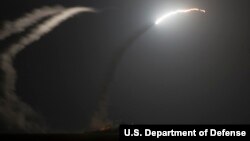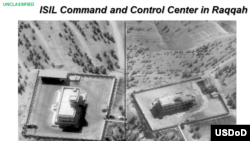The U.S. government says it has attacked Islamic State militants-seized oil refineries worth as much as $2 million per day, potentially crippling the group. But some security experts fear militants are allowing themselves to be targeted in an effort to draw recruits and prepare for a larger war.
The U.S. government said initial strikes on Islamic State targets appeared to have been successful and it was preparing a new long-term strategy in the Middle East. U.S. President Barack Obama explained Wednesday at the United Nations.
“We will neither tolerate terrorist safe havens, nor act as an occupying power. We will take action against threats to our security and our allies, while building an architecture of counterterrorism cooperation. We will increase efforts to lift up those who counter extremist ideologies and who seek to resolve sectarian conflict,” he said.
But some analysts in Beirut said the U.S.-led coalition’s strategy could backfire, widening the Islamic State’s power base.
Director of the Carnegie Middle East Center in Beirut Lina Khatib said IS militants wanted to be seen as targets in order to attract sympathy, and therefore recruits.
She said Islamic State fighters wanted Western countries to attack them, and have prepared for the strikes, hiding their most valuable weapons.
But a senior columnist with An-Nahar newspaper in Lebanon, Sarkis Naoum, said military force could not be avoided and the biggest U.S. mistake in dealing with the militants was waiting for so long to get involved.
He said the Western alliance with Arab states, including Saudi Arabia and the United Arab Emirates, could mitigate the fall-out by changing the narrative. Previous conflicts in the region have largely been viewed in the Middle East as Western imperialism over Muslim countries.
Success or failure in the fight against the militants, he added, could hinge on the West maintaining alliances with the Arab world, and gaining support from Turkey and Iran, two of the most powerful countries in the region.
But Khatib argued the outcome of the military campaign would not matter if the international community was not prepared for the power vacuum that would follow an Islamic State defeat.
Political analyst Maher Salloum said it may take years for military force to “delete” the Islamic State, but efforts must be coupled with solving the economic problems that caused some people to join militant groups in the first place.
“But until now, no action, no sustainable development, no infrastructure, no jobs, no industrialization. No agricultural improvement. People need help,” said Salloum.
Extremism grew, he said, partially through failed economies and corruption.
When military groups offer salaries to fight and preach against leaders already known to be corrupt, their ideologies become more appealing. In parts of Iraq and Syria, already war-torn havens for extremists from around the world, their ranks can grow simply because there are not other available jobs.







